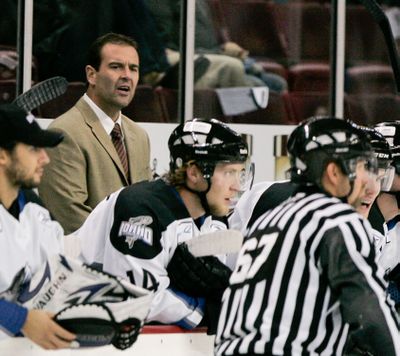Former Chiefs coach doing fine in Boise

When Hardy Sauter was fired as coach of the Spokane Chiefs in May he took the high road.
He never uttered a negative word despite the fact he was released five weeks after his second season as coach of the Western Hockey League team and he had won 91 games – almost two of every three games – in the regular season.
He’s still on the high road.
“I really haven’t had a whole bunch of time to think about it,” Sauter said last week. “I was more concerned about moving forward. There was nothing I could do to change what happened in the past.
“For myself, it was a matter of contacting people and finding a place that: a) we’d be comfortable with, and b) I thought would help further a coaching career. I think I’ve found a place I can develop over the next few years and see if I can keep moving up.”
Sauter is in Boise, coach of the Idaho Steelhead of the ECHL. And right now the Steelhead are in a tight battle in the Mountain Division of the Western Conference, one point out of first.
“It’s good. It’s different, but it’s good,” he said before a weekend series in Las Vegas. “The players are older (than in Spokane). They range from 21 to 34. Obviously, it’s a lot different than 16-20. The travel is different. Because of our location we fly most trips, which is a change for me because I’ve been on the bus so long.
“When it comes to hockey, there are a lot of similarities … the same ol’, same ol’, only different teams and different people.”
There are 19 teams in five divisions in the ECHL, three of them in the east. The Steelhead are right behind the Mountain-leading Utah Grizzlies, two points up on the Alaska Aces and four clear of the Victoria Salmon Kings, despite losing a pair of weekend games to the Pacific-leading Las Vegas Wranglers.
“We’re OK,” Sauter said before the weekend losses. “We started slow, win one, lose one kind of thing.”
He said the Steelhead had won six of their previous seven games.
“It’s the same ol’ story, in our conference you’re a week away from being in first or fourth. It’s that tight. We have to be on top of our game.”
He’s still connected with the WHL, at least emotionally to Spokane.
“I’m glad to see they’ve strung some wins together,” he said. “I do watch stats and stuff. I watch the 20-year-olds, they could be 21-year-olds in this league next year.
“The standard of play is really, really high. A lot of people under estimate it. There are players in our league that were real good, solid 20-year-olds in major junior.”
The Steelhead just signed Junior Lessard, a Hoby Baker winner, the Heisman Trophy of college hockey. On a recent trip to Alaska, he saw Chris Langkow, who was with the Chiefs until being traded when the team solidified their defense for its successful Memorial Cup run in 2008. That championship earned coach Bill Peters a job in the American Hockey League and Sauter, his assistant, was promoted to head coach.
Despite the unhappy ending at his last job, Sauter is very happy.
“I enjoy coming to the rink every day,” he said. “I enjoy the players. I enjoy working on things to get our team to improve.”
And he has improved, on and off the ice.
He pointed to a change in the way his team attacks after pulling the goalie in the closing minutes of a game.
“I think we’ve scored five goals in the six or eight times we’ve had to pull our goalie to try to tie a game,” he said, adding the Chiefs may have scored once in his tenure. “Things like that, for myself, I’ve taken and hopefully improved.”
Maybe more importantly, he said, is communicating with players.
“You’re forced to communicate more because they’re older, more mature,” he said. “They always want to know the why’s and how’s. In that regard I’m improving as well.”
Sauter’s title includes director of hockey operations. That mostly means more administrative work but it also means he can scratch an itch.
“Funny thing, I do miss the bus,” he said. “When you’re on a plane, it’s quicker and convenient, but the camaraderie, the arguing, being stuck in a confined space with a group of people you work and deal with on a daily basis. I do miss it. Saying that, I wouldn’t want to bus to some of the places we go. Next year, if we can swing it, I’m going to throw in a bus trip, because the coach wants it.”